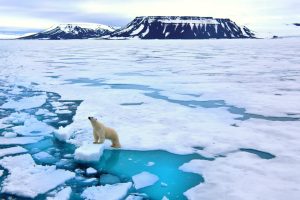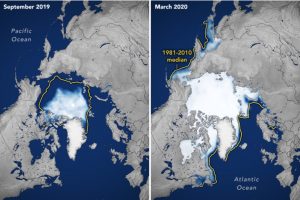16 Dec Arctic Ice Melting
Posted at 16 Dec 2022
in Current Affairs, Daily Current Affairs for UPSC, Environment and climate change
0 Comments
Arctic Ice Melting
The polar ice caps are melting due to climate change caused by global warming. According to NASA, Artic ice is melting at a rate of 13% per decade, and the oldest thickest in Arctic ice has declined by 90% in the last 30 years.
As per the IPCC report, Artic is likely to become ice-free by 2050.

Arctic Melting
Reasons for the fast rate of Melting in the Arctic:
- Albedo Feedback Loop: As global ice has decreased, the reflectivity of Earth has decreased, more incoming solar radiation is absorbed by the surface, and the surface warms.
- Darker Ocean Surface: Dark ice replaces the bright ice of the Arctic in the Ocean Surface which reflects less incoming solar radiation, fuelling additional heat and ice loss.
- Weather events: A freak heat wave, wind, and ocean currents break up and spread the ice which makes it prone to melt at a faster rate.
- Counter-clockwise circulation: Cyclones entering Siberia generate counter-clockwise winds and drifts ice. This pattern reduces the amount of ice moving through the Farm Strait, East of Greenland.

Pic: Arctic Ice Melting
Impact on Weather Patterns of the Planet:
- Permafrost Thawing: Permafrost in the Arctic stores huge amounts of methane. When the ice melts, it releases a copious amount of gas which increases the rate of global warming and induces climate change.
- Sea-Level Rise and Coastal Communities: Artic which is considered Earth’s refrigerator has lost ice in substantial numbers which have released a significant volume of water into the sea and oceans resulting in Sea Level Rise and endangering coastal communities.
- Biodiversity Threat: Rapid melting of ice makes diversity more vulnerable to extinction as their habitat is under threat and loss of ecological niche. The global community should be cognizant take Arctic Melting and should initiate targeted measures. Given the vital role of the Arctic in influencing global climate, it is in humanity’s interest to mitigate ice retreat in the Arctic.
Source:
IAS Current Affair
Get the latest Current affairs for the IAS examination from Plutus IAS. Every UPSC examinee can read the best and most important daily, Weekly, and monthly current affairs for the UPSC examination from our site.



No Comments